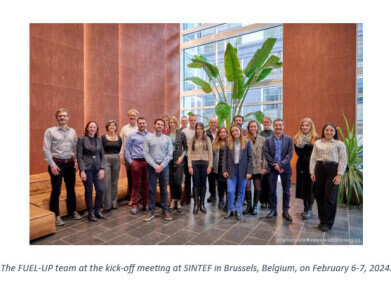Sustainable aviation fuel (SAF)
How is Gas Chromatography Used for Oil Analysis?
May 10 2022
Gas Chromatography (GC) was first developed by Russian scientist Mikhail Tsvet in the early 20th century and has established itself as one of the most useful oil analysis tools available to scientists. The analytical and separation technique is founded on the principle that matter separates into individual components as it transitions from a stationary phase to a mobile phase. A highly specialised detector is used to identify these individual components and reveal detailed information about the properties of a sample.
Deciphering crude oil samples
In the petroleum industry, where a crude oil sample can contain hundreds of unique components, Gas Chromatography is an invaluable analytical tool. The technique is widely used across the industry to analyse upstream, midstream and downstream samples. This includes both raw materials and refined finished products. As well as detecting components on the parts per thousand (ppt) level, CG is capable of delivering parts per million (ppm) and parts per billion (ppb) readings.
Want to know more? Below, we take a closer look at Gas Chromatography and how the technique is used for oil analysis.
How gas chromatographs work
Gas chromatographs use an injection system to add samples to the GC inlet, where they’re then channelled into the analytical column. The instruments also feature built-in detectors to identify different components. While the general principle is the same for all gas chromatographs, detection systems can vary depending on the type of instrument being used. In the petroleum industry, the most useful types of detectors are:
- Flame photometric detectors (FPD) to identify sulphur in residues
- Photoionization detectors (PID) to detect aromatics such as BTX
- Thermal conductivity detectors to measure nitrogen, sulphur oxide and inorganic gases
- Flame ionization detectors to calculate carbon concentrations
- Catalytic combustion detectors (CCD) to measure flammable gases
Choosing the right detector for the application can have a big impact on results, so it’s important for analysts to have a good understanding of what options are available and the pros, cons and limitations of each. Data can be used to generate chemometrics data and unlock valuable information. With such enormous potential, it's no surprise chemometrics will take centre stage at the upcoming PEFTEC conference held in Rotterdam.
Leveraging GC in the oil industry
Gas Chromatography has a wide range of applications across the oil industry. For example, some analysts use GC to simulate the crude oil distillation process and maximise yield. Oher analysts rely on the technique to maintain quality and consistency in finished products. At refineries, instruments such as the LowOx UOP 960 analyser are used to determine trace levels of individual oxygenates in liquefied petroleum gas (LPG), naphtha and other gas streams.
Gas Chromatography is also used to determine the source of oil spills and develop clean-up strategies. Oil isn’t the only sector reliant on Gas Chromatography, with natural gas producers using the technique to analyse BTU content and characterise hydrocarbons.
Gas Chromatography is continually evolving and adapting to meet the needs of the oil industry. But it’s not the only technique leveraged by the sector. Find out more about other analytical methods, including Time of Flight Mass Spectrometry, Near Infrared Analysis and Two-Dimensional Liquid Chromatography in ‘Which Instruments & Techniques Are Used for Fuel, Petrochemical & Oil Analysis?’
Digital Edition
PIN 25.6 Buyers' Guide
January 2025
Buyers' Guide Directory - Product Listings by Category - Suppliers Listings (A-Z) Articles Analytical Instrumentation - ASTM D7042: The Quantum Leap in Viscosity Testing Technology -...
View all digital editions
Events
Jan 20 2025 San Diego, CA, USA
Jan 22 2025 Tokyo, Japan
Jan 25 2025 San Diego, CA, USA
SPE Hydraulic Fracturing Technology Conference and Exhibition
Feb 04 2025 The Woodlands, TX, USA
Feb 05 2025 Guangzhou, China



















